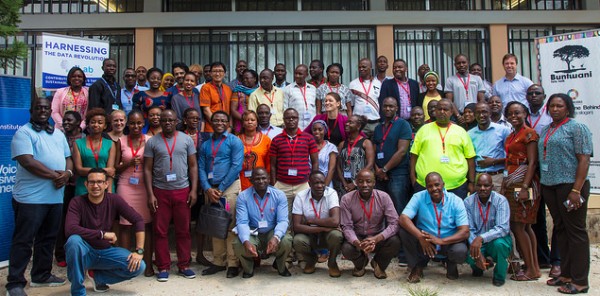A world that counts… Leave no one behind…No one should be invisible…
These were the notions and sentiments that served as the background for the discussions and sharing of learning at this year’s Buntwani unconference, held by the Open Institute and the Tanzazia Data Lab, with the support of Making All Voices Count, on September 4-5 at Dar es Salaam.
Focused on the Global Goals, Buntwani 2017 brought together organisations that use innovations to strengthen citizen engagement and active participation, as well as public sector agents who work with citizens in unique ways and challenged them to reflect on how international, regional and national commitments and activities could be translated into local action and impact.
The name “Buntwani” refers to an open air space where citizens meet to talk to each other candidly, meet with elders and formally meet citizens visiting from other villages.
Globally, citizens have access to an increasing number of tools to monitor government performance and express their concerns and expectations in real time. These developments create new opportunities to promote transparency, fight corruption, empower citizens and make governments more effective and accountable.
The event allowed participants from all over the world to discuss and highlight activities that are happening at sub-national level, while also providing an opportunity for early actionable lessons and observations that are emerging through these projects that can be brought into use within the various communities of practice around openness, including the Open Government Partnership, the Open Contracting partnership,the Global Partnership for Sustainable Development Data, the Global Open Data for Agriculture & Nutrition and others.

Buntwani 2017 was organised around the following key ideas:
Enabling environment - There was a conversation about the ways in which subnational or hyperlocal data initiatives could influence policy for government and also for the donor community on how to better engage and involve citizens and how to better develop citizen voices.
How can we create an environment to share learnings, such as data literacy at a local level, with policy-makers at a national and international level, creating a 360 degree ecosystem?
The civic space and the collaboration in the CSO space - among CSOs, between CSOs and government and between CSOs and citizens- was put under review, while a strong focus was placed on how to avoid working in silos.
How can these initiatives, stakeholders and organisations work together and share lessons learned, technology and innovative approaches?
Creating a community of practice - The participants developed a roster of examples of projects and other organisations and innovative initiatives that involve citizen engagement and data and talked about the need to create a common platform to share learnings and collaborate - on issues such as online and offline tools and engagement strategies and funding opportunities with policy-makers at a national and international level.
The urban data revolution – With the majority of subnational data initiatives and programmes focused on rural and peri-urban areas, a discussion was focused on how the data revolution impacts citizens in cities - especially considering the projected rates of urbanisation in Africa. The participants explored the dynamics, limitations and challenges involving the subnational data projects and initiatives in Africa.
Technology and subnational data revolution - The definitions of innovation and technology - and how they can be agnostic and more process and ecosystem driven- were also put on the table. Participants discussed how a choice of different approaches can be used to achieve maximum impact and in what ways technology can be used as an enabler for citizen engagement and voices.